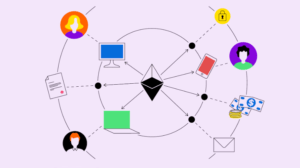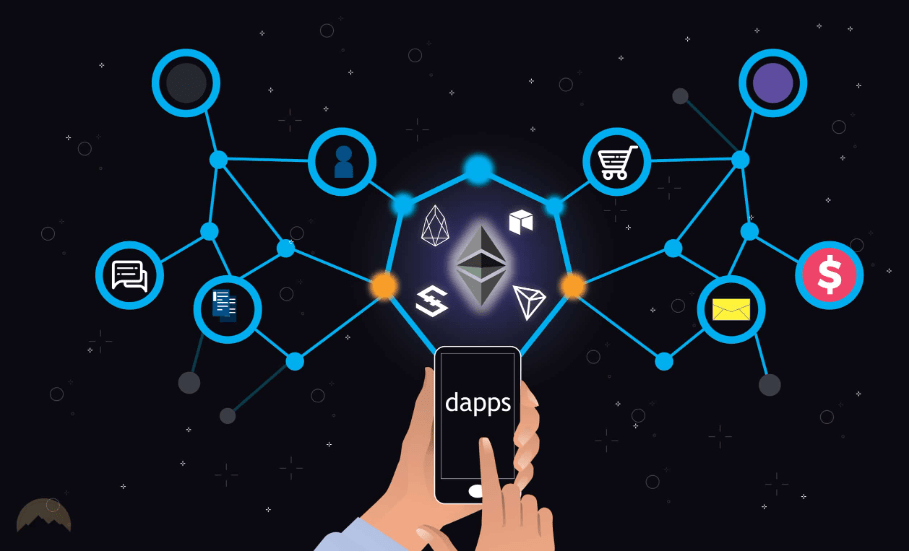Dapps: The Next Big Thing in Blockchain Innovation
Introduction :
Technology is transforming the way people live and work in today’s digital world. Decentralized applications are one of the latest and most revolutionary developments. Decentralized applications transform traditional applications into transparent, decentralized, and secure systems based on blockchain technology. This article will explore the world of Dapps and its definition, benefits, problems, and future prospects.
Dapps: Decentralized Applications Defined

Dapps, or Decentralized Applications, are software applications that operate on a network decentralized, usually built using blockchain technology. Dapps, unlike traditional applications which rely on central authorities or servers to store and validate data, are powered by nodes. Dapps are transparent, unchangeable, and resistant to censorship because of their decentralized nature. Users have more control over data and transactions.
Dapps can be built on platforms like Ethereum, EOS, and TRON. These platforms provide developers with the infrastructure and tools they need to build and deploy Dapps. These platforms make use of smart contracts. Smart contracts are self-executing contracts that have predefined conditions. They facilitate the operation and maintenance of Dapps. Smart contracts remove the need for middlemen and allow Dapps to run autonomously. This makes them more cost-effective and efficient.
Dapps Revolutionizing Industries: Benefits
Dapps disrupt traditional industries and open up new possibilities for innovation. Here are some key benefits of Dapps.
- Decentralization: Dapps are not controlled by a single entity, making them resistant to censorship, tampering, and single-point-of-failure. Dapps are more secure and transparent than traditional applications, which rely on central authorities.
- Transparency Dapps are based on the blockchain, which is a distributed ledger where all data and transactions are recorded. Dapps are transparent and auditable. Users can see and understand what is going on.
- Security Dapps use encryption algorithms to secure transactions and data, making them highly secure and untameable. It eliminates the need to use third-party intermediaries and reduces the risk of hacking and fraud.
- Ownership Dapps allow users to have more control and ownership over their data. Dapps are controlled and accessed by users using private keys. This eliminates the need for middlemen and puts the user in control.
- Global accessibility Dapps can be accessed by anyone with an Internet connection. There are no geographical restrictions or intermediaries. Dapps are therefore inclusive, and new business models can be developed to cater to global markets.
- Incentivized eco-system: Many Dapps offer native tokens and cryptocurrencies to encourage users to join the ecosystem. By contributing to a Dapp, users can earn tokens that can be exchanged for other currencies or used in the Dapp.
Dapps: Limitations and Challenges
Dapps are not without their challenges and limitations. They need to be addressed if they are to become more widely adopted. Dapps face a number of challenges and limitations.
- Scalability Dapps have scalability problems due to limitations in blockchain technology. Blockchain transactions are more expensive and slower than traditional databases. This can affect the performance of Dapps and their user experience.
- Usability Dapps have a steeper curve than traditional applications because they require the user to understand blockchain technology and smart contract. Dapps’ user interfaces and experiences can be cumbersome and complex, which can impact their usability.
- Legal and Regulatory Issues Dapps are a relatively unregulated industry, which may pose challenges to compliance with laws and regulations. Dapps are not regulated, which can cause confusion for Dapp users, developers, and businesses.
- Interoperability Dapps that are built on different blockchain platforms could face interoperability issues since they might not be able to communicate or interact seamlessly with each other. Dapps may be unable to share and collaborate on data. This could limit their potential for adoption.
- Security risks: Dapps, while designed to be secure and resistant to security threats, are not immune. Smart contracts can contain vulnerabilities that malicious actors could exploit, resulting in data breaches or loss of funds. Dapps’ decentralized nature can make it difficult to resolve disputes and seek recourse in the event of fraud or theft.
- Limited Awareness and Adoption Despite Dapps’ potential, they are still at the beginning stages of adoption and many people do not know about their existence. This lack of knowledge can limit the potential of Dapps and the ecosystem.
Dapps are transforming industries
Decentralized applications disrupt various industries and create new business models. Here are a few examples of industries being transformed by Dapps.
Dapps in Finance and Banking
Dapps are being adopted by the finance and banking industries. Dapps revolutionize traditional financial services, providing decentralized alternatives for traditional banks, payment processors, and remittance services. Dapps allow users to send or receive money globally without intermediaries. This makes transactions cheaper, faster, and more transparent. Dapps give users access to decentralized borrowing and lending, asset management, and decentralized exchanges.
Dapps in Supply Chain Management
The Dapps transform supply chain management through end-to-end transparency and traceability. Dapps allow all stakeholders, such as manufacturers, suppliers, and logistics providers, to verify and track the movement of products and services in real-time. Dapps help to reduce fraud and counterfeiting in the supply chain. They also ensure that products are produced in a transparent, sustainable way.
Dapps in Real Estate
Dapps are also transforming the real estate industry, providing solutions for ownership, investment, and management. Dapps allow users to buy and sell properties, as well as rent them, without the use of intermediaries such as real estate agents or attorneys. Dapps can also be used to tokenize properties, where they are represented on the blockchain as digital tokens, which allows for fractional ownership or investment.
Dapps in Social Media and Content Creation
Dapps disrupt the traditional landscape of social media and content production by offering decentralized alternatives which give users greater control over their content and data. Dapps allow users to share and monetize their content without the use of intermediaries or platforms that control and monetize data. Dapps provide solutions for content ownership, copyright protection, and fair compensation so that creators can take more control and ownership of their work.
Dapps in Virtual Reality and Gaming
Dapps are also transforming the gaming and virtual-reality industries since they offer solutions for decentralized games, virtual asset ownership, and virtual economies.
Dapps in Healthcare
Dapps disrupt the healthcare industry with solutions that include data interoperability and patient privacy. They also provide decentralized records of healthcare. Patients can securely share their medical records and health data with healthcare providers using Dapps. Dapps can also be used for telemedicine and remote patient monitoring. They are also an efficient way to bring transparency to the healthcare industry.
Dapps in Energy
Dapps have transformed the energy industry. They provide solutions for peer-to-peer energy trading, grid management, and renewable certificates. Users can buy and sell excess solar energy or energy from other renewable sources directly to another user in a decentralized way using Dapps. It encourages the adoption of renewable energy, reduces dependency on centralized providers of energy, and empowers consumers to become active participants in energy markets.
Dapps in Governance and Voting
Dapps disrupt traditional voting and governance systems by offering decentralized alternatives which are transparent and untampered with. Users can participate in the decision-making process through secure, verifiable decentralized voting systems. This can increase transparency, reduce fraud and promote democratic involvement, giving the people power in the governance process.
Charity and Philanthropy
Dapps transform the charity and philanthropy sectors by providing transparent, traceable donation mechanisms. Dapps allow donors to track donations and verify that they are used for the intended purpose. Dapps are also solutions for decentralized crowd-funding, where donors directly support projects or causes without intermediaries.
Education
By providing decentralized options for learning and certification, Dapps disrupt the traditional education system. Users can access educational content and credentials decentralized and in a verifiable way through Dapps. This can encourage lifelong learning and reduce the cost of educational costs. It also empowers learners to be in control of their education journey.
FAQs
What is a Dapps?
Smart contracts are self-executing contracts that have predefined rules encoded in the blockchain. They govern the operations of a Dapp. Smart contracts allow the Dapp to operate in a transparent and decentralized manner without intermediaries.
What are the advantages of Dapps?
Dapps offer a number of benefits, including increased security, transparency, decreased dependence on intermediaries, and lower transaction costs.
What is the challenge of Dapps?
Dapps are not without their challenges. These include issues such as scalability and usability.
Which industries are being transformed through Dapps?
Decentralized applications have transformed many industries including banking and finance, supply-chain management, real estate and social media, gaming, virtual reality, and healthcare. They also transform governance, voting, charity, philanthropy, and education.
Is Dapps the Future of Applications?
Decentralized applications are capable of disrupting traditional applications and bringing about a radical change in many industries. Their widespread adoption and potential future will be dependent on their ability to overcome the challenges and limitations of Decentralized applications.
The conclusion of the article is:
Decentralized applications are changing the way software is used. They offer transparency, security, and decentralization. Decentralized applications are revolutionizing the way we interact with software. They offer transparency, security, and decentralization.
Also Read About: What is Web3

